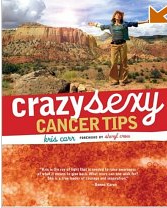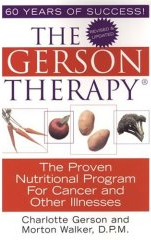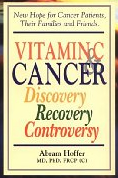Relevant Resources
|
Chemotherapy
Index of Diseases / Health Conditions ... Medicinal Foods, Herbs, Spices & Household Items
The below provides a general overview on this topic and may not apply to everyone.
How does chemotherapy work ...
Traditional chemotherapy artificially manipulates insulin to raise blood sugar levels and then injects toxic chemo agents that eliminate actively dividing cells.
Unfortunately, the toxins don't differentiate cancer cells from healthy cells. So chemotherapy destroys not only the fast-growing cancer cells but also other fast-growing cells in your body, such as cells found in:
- hair follicles (resulting in hair loss)
- reproductive (genetic damage) and digestive systems
- bone marrow (which produces blood)
One of the major side effects of chemotherapy is a low count of infection-fighting white blood cells, which puts patients at risk for infections that may require hospitalization and may even be life-threatening.
However, the toxicity of the chemicals used is also to be considered … please refer to the below.
Risks Associated with Exposure to Chemotherapy Drugs
Increased Risk of Cancer for Hospital & Clinic Personnel
MSNBC reports:
Hospital and clinic personnel who handle toxic chemotherapy drugs are at an increased risk of getting cancer.
"Multiple studies going back decades have found evidence of contamination in areas where workers prepare and deliver chemotherapy. [S]tudies ... have found these agents in the blood and urine of nurses and others who handle them ...
[A] Danish study of more than 92,000 nurses found an elevated risk for breast, thyroid, nervous system and brain cancers in the nursing population." (Source: http://www.msnbc.msn.com)
Therefore, it makes sense that those drugs that are used to treat cancer have the potential to actually cause cancer in healthy people who are exposed to them - even in small amounts.
Holistic medicine optimizes a patient's own natural healing capacities, allowing cancer to resolve normally.
A combination of exposure to toxins / chemicals (environmental & through food), malnutrition (typically involves junk food that is devoid of life-sustaining nutrients), a sedentary lifestyle, stress, and possibly genetic predisposition are primary causes of cancer. Nobody ever disputed that. This being so, it makes sense that cancer can be reversed if those causative factors are eliminated or at least reduced.
No one disputes that some cancers have been resolved through chemotherapy; however, there are plenty of patients who were able to heal themselves entirely through positive lifestyle changes. Chemotherapy does pose the risk of causing cancer sometimes down the line; while a healthy lifestyle will yield benefits far into the future, including overall quality of life and longevity.
Cancer is life-altering, not only for those suffering from cancer, but also for those close to them. Deciding on, and implementing, a proper treatment protocol is crucial. Patients need to consult with highly experienced oncologists as well as professionals in the holistic field, which should also include a nutritionist with knowledge of cancer nutrition and prevention. A proactive attitude, which involves educating yourself on treatment options -- and discussing those with health care professionals - may also be the key to successfully overcoming a life-threatening disease.
Adjuvant treatment for breast cancer increased leukemia risk
Reported in:: Journal of Clinical Oncology, Volume 18:2836-2842, (August) 2000
Patients with breast cancer who are treated with chemotherapy, particularly regimens containing melphalan, are at increased risk of secondary leukemia as documented in Cancer Research 1990 May 1;50(9):2741-6. (Note: With newer chemotherapy agents, such as Taxol, the risk of acute leukemia is unknown and warrants further investigation).
Between 1982 and 1996, 3093 women who underwent surgery for breast cancer were evaluated. Approximately 57% of patients received radiotherapy alone and 31% had a combination of radiotherapy and chemotherapy.
Results
- Ten women were diagnosed with acute leukemia by the end of 1998.
- In women who received radiotherapy without chemotherapy, the risk of leukemia was similar to that of the general population.
- In women who were treated with combined radiotherapy and chemotherapy, the risk of leukemia was multiplied by 28 over the general population.
- In women ages 64 and younger, chemotherapy with mitoxantrone was significantly associated with an increased risk of leukemia.
Teach yourself to get well ...
More than ever, this is one disease where it is of huge benefit to consult with as many holistic as well as traditional medicine professionals as possible. This is not the time to entrust your life to the views of only one doctor. In many cases, getting well and living a long and healthy life is likely to require a complete overhaul of a patient's lifestyle, as cancer - for the most part - is a preventable lifestyle disease.
90-95% of cancer cases a caused by environment and lifestyle. Lifestyle factors that are linked to cancer include alcohol, sun exposure, environmental pollutants, infections, stress, obesity as well as physical inactivity. The biggest cancer risk involve exposure to tobacco smoke and the quality of our diet. Of all cancer-related deaths around 25-30% are due to exposure to tobacco and 30-35% are linked to diet. (Source: Anand P, Kunnumakkara AB, Sundaram C, Harikumar KB, Tharakan ST, Lai OS, Sung B, Aggarwal BB. Cancer is a preventable disease that requires major lifestyle changes. Pharm Res. 2008 Sep;25(9):2097-116).
Cancer survivors that we have met chose the holistic route (and refused chemotherapy) and it worked for them. This may, or may not, be the right course of action - however, adopting a healthy lifestyle can only help in your healing process ...
Holistic / Complementary Cancer Protocols
Prostate Health
Breast Health

Chemotherapy:
We associate hair loss with chemotherapy, but loss of appetite is a far more serious problem. Chemo and radiation therapies cause nausea, vomiting, altered senses of taste and smell, sore mouth and throat, diarrhea and constipation. Cancer patients frequently become underweight and malnourished. According to Patrick Quillin, Ph.D., RD, CNS - a clinical nutritionist in Encinitas, California, 40% or more of cancer patients actually die from malnutrition.
Mitchell Gaynor, MD, Clinical Assistance Professor or Medicine College of Cornell University and President of Gaynor Integrative Oncology in New York Cit, recommended including a cancer nutrition expert as part of your healthcare team, who determines your level of vitamins, heavy metal toxicity, and immune function. Armed with that information, they can customize a strategy to keep you well nourished. While individual needs vary, many experts list the following as top picks for nutritional support:
- Fish / Fish oil: Omega-3, called EPA, may help immune cells recognize and destroy cancer cells and thus slow their spread, recommends Dr. Qillin.
- Click here to find the best and the worst fish to eat
- Also refer to health benefits of Cod Liver Oil
- Curcumin: Turmeric gets its yellow color from an antioxidant. This potent antioxidant has been shown to induce cancer cell suicide without damaging healthy cells. Dosage: 100 to 800 mg curcumin in capsule form daily or liberal use of turmeric in foods.
- Garlic: May improve appetite by reducing the side effects of chemotherapy and radiation. Garlic protects your healthy cells.

Selenium Cuts Death Rate from Cancer in Half!
A daily supplement of 200 microgram of selenium, has been shown in a large placebo-controlled, double-blind clinical study -- the most prestigious type of scientific study of nutrients and drugs -- to cut the death rate from cancer in half.
Specifically, a large group of people who were given each day a yeast tablet enriched with 200 micrograms (mcg) of selenium had only half the number of deaths from cancer over a seven year period as a similarly large control group who were given a daily yeast tablet containing no selenium.
Yeast tablets enriched with 200 mcg of selenium are readily available at pharmacies as well as health stores across the U.S. for about $5 or so for a bottle of 50 to 100 tablets -- only 10 cents or less per day.
The results of this dramatic study were published in the medical profession's own journal: The Journal of the American Medical Association. Nevertheless, most doctors pay no attention to the results.
Selenium (at 10 cents per day or less) has been shown in a large clinical study to cut the death rate from cancer in half and nobody informs the public about it.
According to the National Cancer Institute (NCI), research suggests that long-term use of selenium supplements may reduce men's risk of developing prostate cancer by 60 percent. Larger studies are underway.

Could it be that easy to cure cancer?
A World Without Cancer - The Story Of Vitamin B17 57 Minutes
Here is the full text:
G. Edward Griffin marshals the evidence that cancer is a deficiency disease - like scurvy or pellagra - aggravated by ... all » the lack of an essential food compound in modern man's diet. That substance is vitamin B17. In its purified form developed for cancer therapy, it is known as Laetrile.
Why has orthodox medicine waged war against this non-drug approach? The author contends that the answer is to be found, not in science, but in politics - and is based upon the hidden economic and power agenda of those who dominate the medical establishment.
With billions of dollars spent each year on research, with other billions taken in on the sale of cancer-related drugs, and with fund-raising at an all-time high, there are now more people making a living from cancer than dying from it. If the solution should be found in a simple vitamin, this gigantic industry could be wiped out over night. The result is that the politics of cancer therapy is more complicated than the science.
GreenAndHealthy.Info strives to maintain accurate and up-to-date information; however, mistakes do happen. If you would like to correct or update any of the information, please send us an e-mail. THANK YOU!

